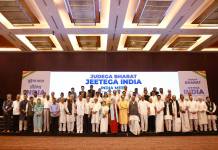Mukesh Adhikary
The government’s crackdown on JNU is not just alienating the youth of the country, but also offering a strong issue to a weak opposition.
The strategy does not make any political sense.
So, why is the government doing what it is doing and what has made the situation go completely out of control?
The answer lies in the history of India’s academic institutions.
The academic world has predominantly adhered to either the Nehruvian thought or to the leftist ideology since the independence.
The parent body of right-wing politics, led by the Rashtriya Swayamsevak Sangha (RSS), has largely remained at the fringes of India’s academic establishments.
The fiercely nationalistic thinking of the Akhil Bharatiya Vidyarthi Parishad(ABVP), the student-wing of the RSS, has also largely failed to attract the intellectuals. The ABVP’s attempts to reach a feverish pitch whenever the BJP, which takes its ideological impressions from the RSS, comes to power at the Centre.
And, in the past 12 months, the academic space seems to have rapidly shrunk for other opinions because the ABVP has been getting more than active support from the Prime Minister Narendra Modi-led government.
Most parties do not publicly interfere in student politics, even though they quietly guide it. The NSUI gets logistical support from the Congress and so do many left-wing student bodies from Communist parties.
The BJP has broken this clandestine but peaceful approach to student politics in recent months. They have brought student politics in the national discourse for all the wrong reasons.
First, in Hyderabad, where the university was put under pressure to act on those standing against the ABVP. The fallout of which was the death of Rohith Vemula.
And now, the active response to complains from the ABVP has led to the arrest of Kanhaiya Kumar, the leader of JNU Students’ Union.
The ABVP has been empowered thanks to a government that listens to it.
Hooliganism not nationalism
The RSS’ idea of nationalism, meanwhile, has been repeatedly invoked to stoke anger. The emphasis has been on building a narrative that brackets people with any other ideological leanings as anti-national.
And Modi has again been silent but he can’t afford to speak up.
Nothing is more important for the RSS than expanding its reach in academic institutions, which it sees as part of its strategy to promote what it considers as India’s true nationalistic culture.
The group may go soft on other strategies of the BJP, but it will never make any concessions to the government on its cultural outreach.
The lawyers’ attack on journalists, JNU students and Kanhaiya in the Patiala House Court is a manifestation of this hyper-nationalism.
The mindless and absurd actions of these lawyers in the court of law are reflective of brash nationalism that the right-wing groups espouse.
The involvement of lawyers in such boorish behaviour is a bad precedent. Any group anywhere will now feel bolstered to come together and thrash people while chanting nationalist slogans.
If anything, it is a complete bankruptcy of nationalism in the country.
A group of thugs, with doubtful professional credentials, were able to turn one of the most important pillars of democracy into a joke.
The political leanings of the attackers haven’t been conclusively established, but they certainly came across as people who subscribed to the hard-line right-wing ideology.
These are dangerous people who in the garb of nationalism have been waiting to carry out attacks on democracy.
Few reckless slogans by some misguided students have given these elements a perfect opportunity to unleash violence against their ideological rivals.
Police action or inaction?
The Delhi Police, meanwhile, has played the most disappointing role in this entire fiasco.
The unintelligent political decision of clamping down on students gave the police due excuse to come down hard on the JNU students.
The police in the past one month has very clearly taken a side.
A week before the arrest of Kanhaiya, the Delhi police had used force on students from the JNU and a few other institutions who were protesting near the RSS headquarters in Delhi.
The video from the incident, in which women protesters were also manhandled, had gone viral.
Meanwhile, they have not taken any action on lawyers in Patiala House, the ABVP students who roughed up Congress leader Anand Sharma, the Bajrang Dal activists who pledged to kill JNU students outside the university gates, and BJP MLA O.P Sharma who was caught on camera beating up a man in the Patiala House Court.
The police had made no effort to diffuse a volatile situation.
Thankfully, there is the Supreme Court
But with the situation getting out of hand and the Supreme Court intervening, the Delhi police chief B.S Bassi is now on damage control. He has said that the police will have “no objection” if Kanhaiya gets bail.
The government, very slyly, has rebuked the police force for showing “over-enthusiasm” in its crackdown on the students.
But can it go further than that? The past doesn’t give much hope.
Mukesh Adhikary is an independent journalist and has previously worked with the BBC
















